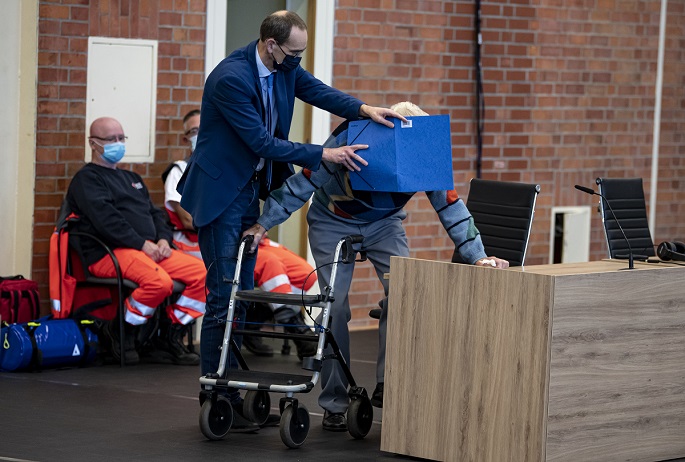100-year ex- guard keeps silent as wartime murders trial starts in Germany
Published : 07 Oct 2021, 22:42
Updated : 07 Oct 2021, 22:44
A 100-year-old former SS guard on trial for aiding and abetting mass murder at Sachsenhausen concentration camp during World War II maintained his silence at the start of proceedings on Thursday.
The accused, who entered in a wheelchair, held up a folder to cover his face as the trial began in a sports hall in the town of Brandenburg an der Havel, with numerous journalists from Germany and abroad observing the proceedings held under conditions of strict security.
The man's lawyer, Stefan Waterkamp, said he would respond regarding his personal details on Friday, insofar as this did not concern the charges.
The accused faces charges related to a total of 3,518 cases between 1942 and 1945, with the prosecution alleging his actions were intentional and motivated by malice.
State prosecutor Cyrill Klement described in detail the way thousands of people died at the camp to the north-west of Berlin between 1941 and 1945. Many of the killings were carried out by mass shooting in special facilities or in gas chambers. Others died as a result of disease, hunger, forced labour, medical experiments or maltreatment.
"The accused knowingly and willingly supported this, at least through conscientious guard keeping, which was incorporated seamlessly into the killing system," he said.
More than 200,000 people were held at the camp between 1936 and the end of World War II in 1945, including political opponents of Nazi dictator Adolf Hitler's regime, as well as Jews, Sinti and Roma.
Christoph Heubner of the International Auschwitz Committee expressed disappointment at the accused's decision not to speak.
"We are now hoping when relatives give evidence about the murder of their fathers in Sachsenhausen, that this emotion will perhaps reach the background of the accused and that he will be prepared to find words to build a human bridge between his story and the suffering of others," Heubner said.
Most SS guards had maintained their silence, he said, describing this as a rejection of the survivors.
"One was vermin, one was somewhere down below, one was not spoken to and not looked at. One was simply yelled at," Heubner said. He described this as a bitter experience for the witnesses at the trial.
Thomas Walther, a lawyer acting for the co-plaintiffs, said he hoped the accused would explain himself. This depended on the extent to which the court could get through to him, Walther said.
Holocaust survivor Leon Schwarzbaum, who was born in 1921 and is the same age as the accused, survived the camps Auschwitz, Buchenwald and Sachsenhausen.
"This is the last trial for my friends, acquaintances and my dear ones who were murdered, at which the last guilty parties will hopefully be convicted," he said.
A total of 22 days into January next year have been set aside for the trial, with only a few hours per day permitted on account of the accused's health.
Walther said ahead of the trial that the German justice system had neglected for decades to pursue Nazi criminals.
"I see it as a major mistake on the part of the justice system over past decades that the offence of aiding and abetting has not been prosecuted," he said.
The 2011 conviction of John Demjanjuk, who was extradited to Germany from the United States, set a legal precedent in opening the way for the prosecution of camp guards as accessories.
Several trials ensued, and a 95-year-old woman is currently on trial near Hamburg for her role as a secretary to the commandant of Stutthof camp.


